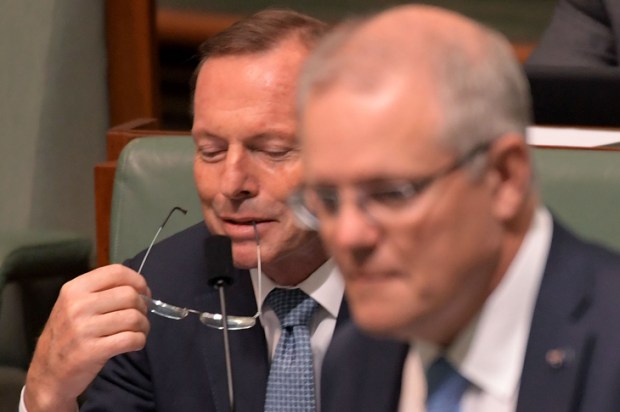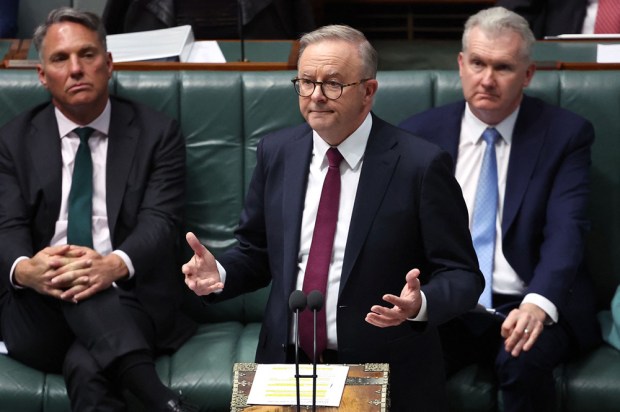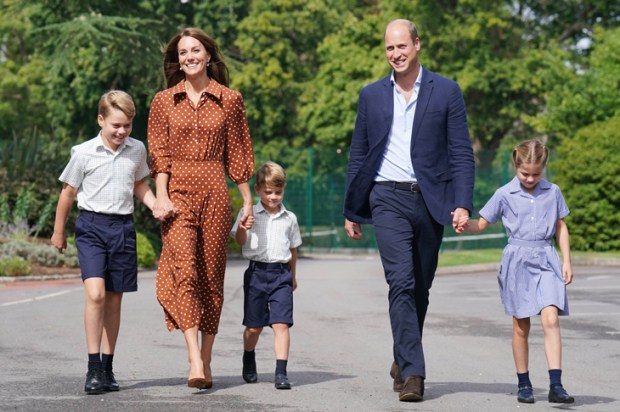The Constitution belongs to the Australian people, and to no one else. In demonstrating their support for this fundamental principle, Tony Abbott and Scott Morrison have ensured that not only will the people decide on whether there is to be radical change to marriage, but they will also at last be allowed to hear both sides of the debate.
This arose during a particularly cold winter, when, with snow falling on the capital at noon, global warming was put aside by the elites as their preferred question du jour. That is, until they shamelessly add their emissions to the Paris climate conference’s CO2 footprint.
In its place is yet another dogma received by all bien pensants as infallible: same sex marriage.
Their plan was to secure the votes of those ministers supportive of ‘marriage equality’, but not so supportive as to give up their seats at the cabinet table.
To the elites’ surprise and outrage, Tony Abbott’s reaction was to do what he had promised to do at the last election, refer this to a Coalition joint meeting. The meeting decided on a conscience vote, but only after the next election. So did a majority of Liberals, in spite of a claim that Abbott had manipulated the vote.
Abbott had a second surprise up his sleeve, one again based on principle. Instead of the politicians and judges deciding the issue , this would be a matter for the people. This is the very last thing the elites want. Despising the rank and file for their common sense, they know the referendum process will let them hear both sides of the debate.
Hitherto the commentariat have ensured that the people are bombarded with the pro-marriage equality case, and hear little from the other side.
This is done on the ABC, as Gerard Henderson explains, by debates in which everybody (or almost everybody) agrees with everybody else. On TV news bulletins, both national and commercial, this is achieved though the regular insertion of what are no more than editorials by the Canberra press gallery, all camouflaged as news.
Without a referendum, the commentariat will continue to ensure that the people hear little of the arguments against radical change, and the serious consequences likely to flow from that. They even have the gall to promote various opinion polls, knowing full well these have been taken without the people hearing both sides. Nothing new here, this was their strategy during the republican debate and again over that knighthood.
The Marriage Alliance says its advertisements have been rejected by two television networks. A Catholic Bishop was threatened with being gagged, as Andrew Bolt was. Earlier this year three Christian books extolling traditional marriage were banned in NSW schools.
Imagine what would happen if the change were made. In Canada, words like ‘mother’ and ‘husband’ as well as the celebration of ‘Mother’s Day’ are now being targeted.
Another tactic is to terrify the more nervous Liberals. According to the Australian’s Paul Kelly, Malcolm Turnbull ‘believes the same-sex train and its money power will steamroll the government at the election.’
Has Turnbull forgotten the 1996 election? As gullible Liberal politicians jumped onto the Keating-Turnbull bandwagon for a republic that was declared ‘inevitable’ by the commentariat, John Howard neutralised the issue with just one announcement. The question, he said, would be decided by the people in a referendum.
And as for ‘money power’, has Turnbull forgotten that monarchists, operating on the smell of an oily rag, ran rings around his richly-endowed, media and celebrity-supported movement?
In any event, government policy is now locked in. Turnbull must either accept this or go to the backbench. As to the form of vote, Scott Morrison is right when he says that this should be by way of a referendum.
Plebiscites can have a place, but consisting only of a question they are open to abuse. A plebiscite is too often no more than a blank cheque to the politicians to fill in the details after the vote. This question is after all about the power granted by the people in their constitution to legislate with respect to ‘marriage’.
From the federation convention debates it is clear that the word ‘marriage’ means a voluntary union between a man and a woman to the exclusion of others, entered into for life, but potentially terminable by divorce. Those opposed to a referendum say it will be costly, but Labor plans to spend at least four times as much in a pointless re-run of the republic issue. They also cling to some words of gratuitous advice proffered when the High Court found that the ACT assembly could not go off on a frolic of its own and introduce same-sex marriage into Canberra.
The constitution means what the people intended it to mean, the shorthand term for which is the ‘original intention’. America’s best known judges are committed to a similar approach.
The alternative is that the Constitution means what the judges say it means. This is the ‘Humpty Dumpty doctrine’, based on his ruling: ‘When I use a word it means just what I choose it to mean — neither more nor less.’
The vice of judicial activism emerged long ago in the United States. The worst example was when the Supreme Court imagined that the constitution entrenched slavery, tragically propelling the country towards the civil war. This vice has spread to Australia, with the High Court cavalierly refusing to be guided by decisions of the people in a series of referendums in all of which they refused to grant more power to Canberra. This will have to be changed, but in the meantime, there is no reason to genuflect to the judicial oligarchy. What the nation can be assured of is that in any referendum held under the second Abbott government, both sides will be treated fairly, as they were in 1999.
Tony Abbott would never do what the Gillard government planned to do with the proposed local government referendum. The ‘Yes’ case was to receive massive taxpayer and ratepayer funding; the ‘No’ case was to be starved of funds.
A ‘garbage tin amendment’ was passed to stop individual electors receiving a personal copy of the Yes/No cases. Instead, only one copy would go to each residence, with the likely and intended result that most would have ended up in the garbage.
Tony Abbott has put the issue off the agenda until the next term when the people will decide. As expected, the commentariat portrays what is a triumph based on principle as a disaster.
Got something to add? Join the discussion and comment below.
Get 10 issues for just $10
Subscribe to The Spectator Australia today for the next 10 magazine issues, plus full online access, for just $10.
You might disagree with half of it, but you’ll enjoy reading all of it. Try your first month for free, then just $2 a week for the remainder of your first year.













Comments
Don't miss out
Join the conversation with other Spectator Australia readers. Subscribe to leave a comment.
SUBSCRIBEAlready a subscriber? Log in